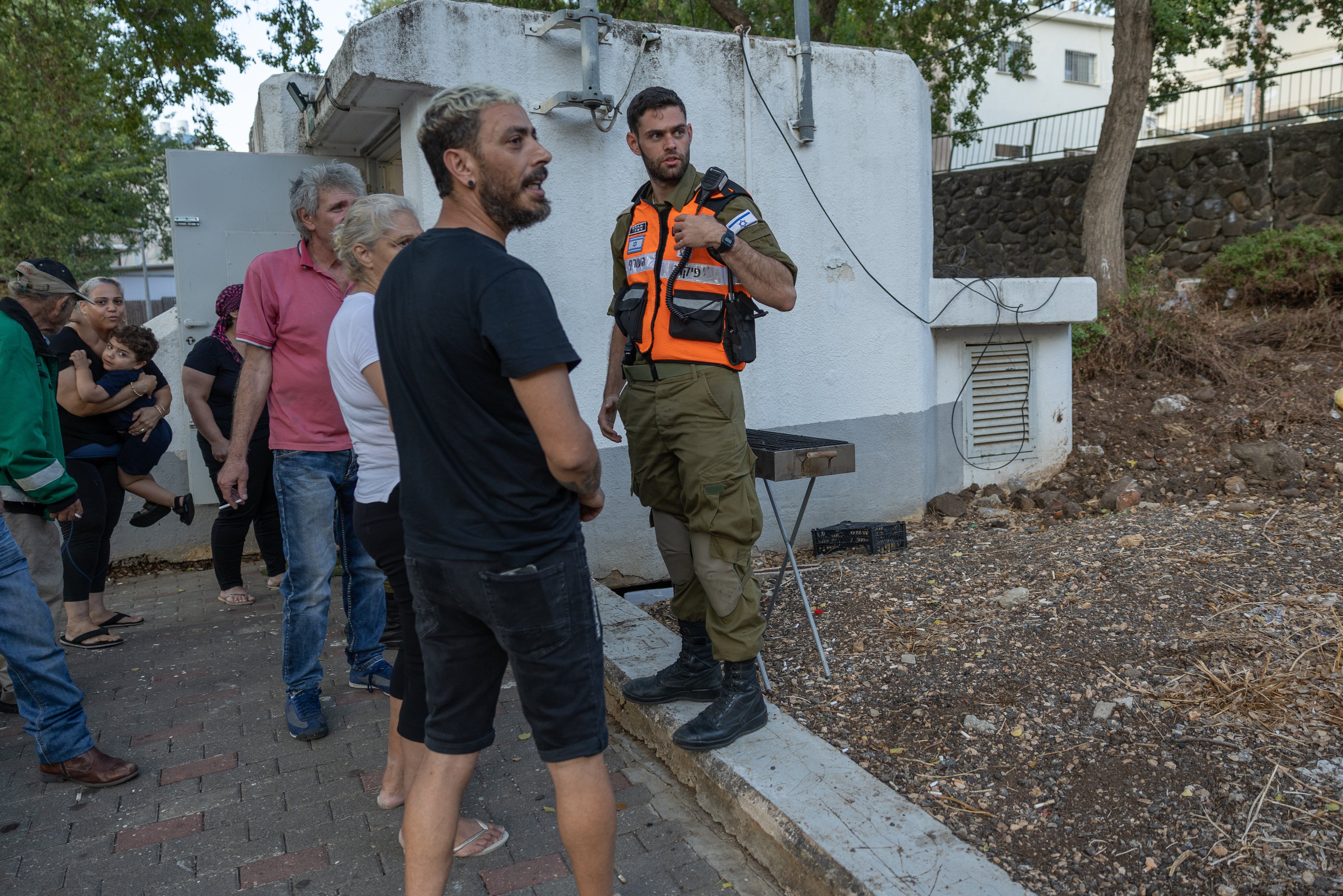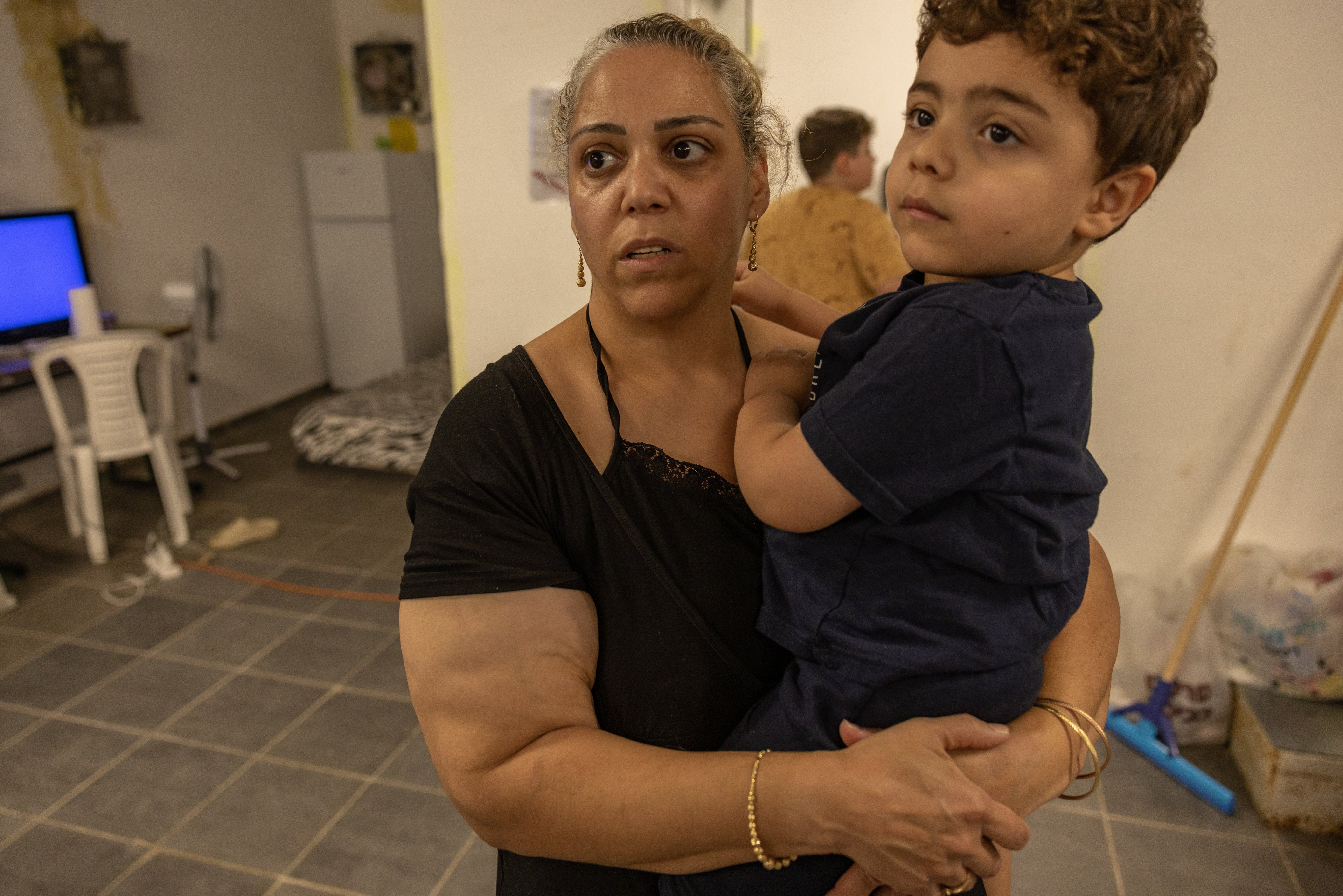From Lebanon to Iran to Syria – the threat of a wider Middle East war is growing by the day
Bel Trew visits northern Israel where residents near the border with Lebanon fear a war with Hezbollah as rocket and tank fire is exchanged daily. It is one of a number of fronts close to igniting over the bombardment of Gaza


At Israel’s northern border, the metronome of artillery and rocket fire hammers home one of the biggest concerns right now: that tensions here could turn the conflict with Gaza into a region-wide war for the Middle East.
Cross-border battles between the Israeli military and Hezbollah, a Lebanese militant group allied to Hamas and supported by Iran, are steadily increasing in step with the rising ferocity of Israel’s bombardment of Gaza.
Despite the fact that it doesn’t feel like anyone wants a full-scale regional war, the security situation is rapidly deteriorating to the point where posturing about war might make it inevitable.
On Wednesday, the top leadership of Hezbollah, Hamas and Palestinian Islamic Jihad met in Beirut. All in what Iran’s Supreme Leader Ali Khamenei has called the “axis of resistance”, the militants were said to have discussed how to “achieve a real victory for the resistance”.
Families in Israel’s northern border communities, who lived through the last war between Israel and Lebanon in 2006, are worried.
“This almost feels worse than the build-up to 2006,” says Sharon Azolay, 50, a father-of-five, whose sister was injured in that conflict 17 years ago. He is trying to evacuate his family again – they fled south in 2006 as well.
“Hezbollah has had years to train and become battle-hardened in Syria’s war, they have powerful Iranian weaponry now,” he continued. “This isn’t the same as before.”

The Israeli military has evacuated tens of thousands of civilians and whole communities to create a “buffer zone”, concerned the army will have to fight in the north and the south simultaneously.
Israeli military officials have also scrambled to repeat warnings to Hezbollah that it “risks its future” if it opens a second front.
Advisors to the Israeli government, speaking to The Independent, have gone as far as to threaten that if full-scale war is declared, “Beirut may not exist as it does.” All evoke the nightmare of 2006, as a cautionary tale.
“If Hezbollah decides to enter the war… it will be making the mistake of its life,” prime minister Benjamin Netanyahu warned, in a recent visit to the troops along the border with Lebanon.
But the posturing is fuelling fears this could ricochet well past Israel, and the region to the wider world. Jordanian foreign minister Ayman Safadi best spelled it out this week in an interview with CNN.
As Western countries like the US and the UK throw their full “unequivocal iron-clad” support behind Israel, the perception on the streets of the Middle East is that “this is a Western [versus] Arab-Muslim war,” he warned.
“That is a place we don’t want to get to,” Mr Safadi added, emphatically.

The White House, deeply concerned, is said to have leaned on Israel to delay a devastating ground invasion of Gaza, in part to allow the US time to bolster its military assets in the Middle East in case the worst happens.
The US state department confirmed it has deployed two carrier strike groups to the Eastern Mediterranean –including aircraft carrier USS Gerald R Ford.
The fighting along Israel’s northern frontier began as occasional cross-border exchanges of fire, when Israel launched its heaviest-ever bombardment of Gaza, in retaliation for the 7 October attack by Hamas militants who killed more than 1,000 people and took hundreds more hostage.
But as the death toll in Gaza has soared – the Hamas-run health ministry says more than 6,500 people have been killed, including 2,700 children – the exchange of anti-tank fire, rockets, shelling and airstrikes has increased.
The promises of a full-scale Israeli ground incursion into the besieged strip – which would see a significant increase in civilian casualties – have also prompted warnings from Lebanon and Iran of all-out war.
Neighbouring Syria, where Iran has a strong military presence, is increasingly moving into the fray. Israel says Syria has launched multiple rockets at it, igniting concerns of a third front.
The Syrian authorities say Israel has repeatedly bombed targets including the Damascus and Aleppo airports – most recently on Tuesday night: when Israeli air raids in the southwest of the country killed eight soldiers.

Last week, a US warship shot down more than a dozen drones and four cruise missiles fired by Iranian-backed Houthis from Yemen – apparently toward Israel.
Tensions are soaring in Iraq. Iraqi militias had warned that a US intervention in the Israel-Hamas war would make Americans “legitimate targets”. Washington has since registered a surge in rocket and drone attacks by Iranian-backed militias on hundreds of troops stationed in both Iraq and Syria.
Iran’s foreign minister, Hossein Amir-Abdollahian, warned Israel this week that the Middle East could “spiral out of control” if it does not stop strikes on Gaza. Top Hezbollah official Hashem Safieddine said in a recent speech that there are tens of thousands of fighters around the region “whose fingers are on the trigger”.
And so on the Israeli side the military is preparing. Over the last week, the military has been busy evacuating communities along the border, not just to protect civilians but “to strengthen our posture and give us the freedom of activity there on the border,” Lt Colonel Richard Hecht, an army spokesperson, told The Independent.
In the border towns asked to evacuate, local authorities say they are scrambling to move thousands to hotels and other accommodation across the country, in scenes reminiscent of 2006.
So far Israel has evacuated 42 communities along its northern front, and around 100,000 people have been moved. Among them is Kiryat Shmona, close to the border with Lebanon.

“We get about 10 seconds to move to the shelter when the sirens sound, it means if people stay here they will have to live underground, “ Avihay Shtern, the mayor of Kiryat Shmona told The Independent as artillery fire boomed in the background.
“We need a buffer with Lebanon right now to allow the army to operate,” he added.
The interview was interrupted by Azolay, the father-of-five, who was furious that he had not received confirmation from the authorities of where the evacuation buses would rehome his family.
Osher, 21, who was helping his two friends, soldiers, pack a car for a base further north said more than half the town had already evacuated and those who were staying “are preparing”.
“We are trying to remember what it was like in 2006 team to make sure we're prepared. We don’t know what will happen,” he said.
This is echoed by Eiad Habus, 51, an Arab-Israeli dentist who works in Kiryat Shmona but is from a nearby Druze village wedged between the border regions with Lebanon and Syria. There people are stockpiling food, water and bread in case of a double-sided pincer attack.
He said everyone feared this conflict was actually worse than anything they had lived through before because of the massive security and intelligence failures in the south of Israel that led to militants being able to raid southern Israel on 7 October.
“People don’t trust the intelligence services of Israel anymore,” he said. “My wife doesn’t sleep at night - she is scared to go to her shelter. Before we worried about rockets, now we are worried about fighters crossing into Israel.”
For now, the conflict is contained but simmering. Rallies in support of civilians in Gaza (and in many cases in support of Hamas) have been held across parts of Israel’s regional neighbours, with people demanding a humanitarian corridor and ceasefire.
The fears of this escalating mean families in the north are sleeping in underground bunkers.
Mother-of-three Efrat Peretz, 43, said all they can do is prepare for the worst.
“We don’t know what to do, this is far more terrifying than anything before,” she said, as she sat on a mattress glued to the news on a television.
“Here we are surrounded by Lebanon and Syria. We are trapped.”






Join our commenting forum
Join thought-provoking conversations, follow other Independent readers and see their replies
Comments